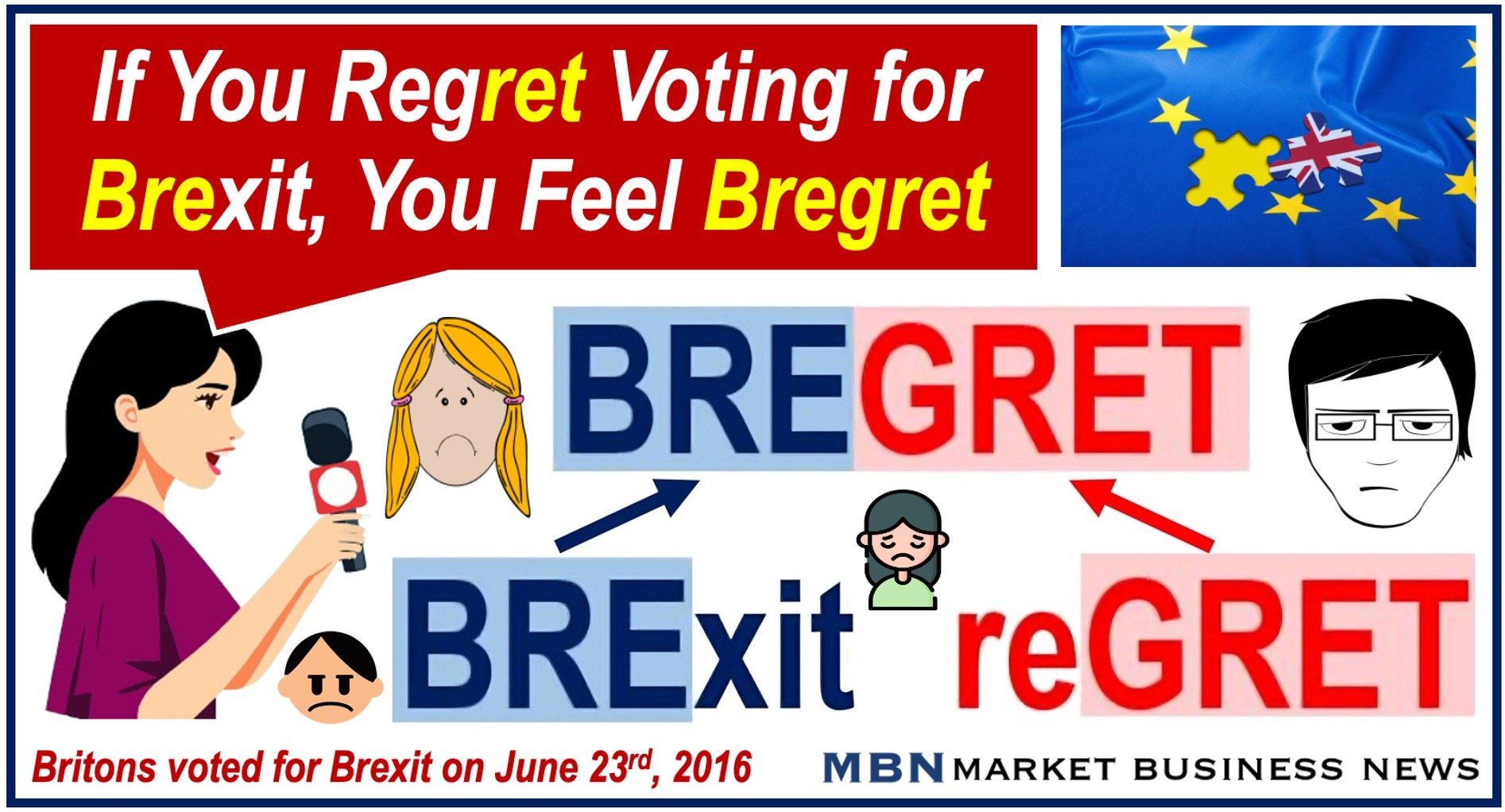Since the historic referendum, which took place on June 23rd, 2016, when a slim majority of Britons voted to leave the European Union by 51.89% to 48.11%, public sentiment toward Brexit has shifted. “Bregret” has grown.
Once a decision framed around sovereignty, control, and trade, Brexit is now seen by many as a source of regret.
This new sentiment led to the creation of the word “Bregret”, which means Brexit Regret.
Wikipedia has the following definition of Bregret:
“A portmanteau of “Brexit” and “regret”; used by people who voted in favor of the Brexit referendum, but now express regret after seeing the aftereffects.”
The term ‘portmanteau’ means a word blending the sounds and meanings of two different words.
Bregret raises questions about the economic and social impacts of leaving the EU and whether the UK might reconsider its relationship with Europe.
Public Sentiment: Bregret on the Rise
According to the majority of polls conducted since June 2016, a growing number of Britons believe leaving the EU was a mistake.
By May 2024, 55% of respondents to a Statista poll said Brexit was the wrong decision, compared to 31% who still supported it.
Interestingly, even some who voted Leave in 2016 express regret, with around 18% saying they would vote Remain if given another chance.
More Britons today express regret about leaving than support for the UK rejoining the EU.
According to polling, only 48% of Britons would support a referendum on rejoining, and that figure drops further when conditions such as adopting the euro are included.

Economic Impact: A Slow Puncture
Brexit’s economic effects have been felt across multiple sectors:
- Business investment has declined.
- Trade barriers have increased costs.
- Food prices have soared by 25% since 2021.
- Many small businesses, particularly exporters, face challenges due to customs checks and bureaucracy.
- The UK economy, once a leader among G7 nations, now lags behind its peers.
Immigration and Labor Shortages
One area of contention is immigration. While Brexit promised tighter control over borders, the UK remains reliant on foreign labor in industries such as hospitality, healthcare, construction, transportation, and agriculture.
Paradoxically, these restrictions have exacerbated labor shortages, making it harder to fill critical roles. Waking up to this reality has significantly contributed to the growing feeling of Bregret.
Political Stalemate: Moving Beyond Brexit
Politically, Brexit remains a thorny issue. Britain’s Conservative Party, which was deeply associated with the 2016 Leave campaign, has faced declining approval ratings.
Meanwhile, Labour’s Keir Starmer has adopted a cautious approach, focusing on improving trade relations without advocating for rejoining the EU.
This reflects a broader public fatigue with the topic—once a polarizing national debate, Brexit now ranks low in public concerns.
Most Britons, from both sides of the fence – Brexiteers and Remainers – are fed up with the topic of Brexit and Bregret. They would like to move on and focus on other priorities such as the economy, jobs, prices, healthcare, education, climate change, and infrastructure development.
The Bank of England’s Governor
The Bank of England’s governor, Andrew Bailey, has also commented. He explained that Brexit had “weighed” on the economy, in particular the UK’s trade in goods.
He said,
“We must be alert to and welcome opportunities to rebuild relations while respecting the decision of the British people.”
Many were surprised by Bailey’s comments. Central bank governors tend not to make public statements about contentious political issues.
However, the government remains reluctant to reopen Brexit debates, fearing renewed divisions.
Social Effects: A Divided Nation
Brexit has also left its mark on British society. Europeans living in the UK report feeling alienated, with increased paperwork and suspicion toward foreigners being common complaints.
For many, Brexit symbolized a rejection of multiculturalism, with some choosing to leave the UK altogether. Those who remain often speak of a diminished sense of belonging.
With Growing Bregret, is a Reset Possible?
While rejoining the EU seems unlikely in the short term, there is growing support for a closer relationship.
Proposals such as regulatory alignment, reduced trade barriers, and flexible immigration quotas could address some of Brexit’s shortcomings without reopening the wounds of 2016.
For this to happen, the UK government would need to approach the EU with evidence-based proposals and a commitment to rebuild trust.
Conclusion
Eight years after the referendum, Brexit remains a contentious and unresolved chapter in British history. While Bregret grows, political and societal divisions make a full reversal unlikely.
Instead, the focus may shift toward pragmatic solutions to improve trade, rebuild relationships, and address the economic challenges that have emerged since Brexit.
For many Britons, the question is no longer whether Brexit was the right decision, but how to navigate its consequences effectively.
Perhaps Donald Trump’s election victory in the United States will encourage Britons and Europeans to move closer together. Their militaries have already done so.
Trump has threatened to impose tariffs of 20% across the board on all imports. Could the risk of a damaging trade dispute with the United States make closer ties with the European Union a more appealing option for the UK?
